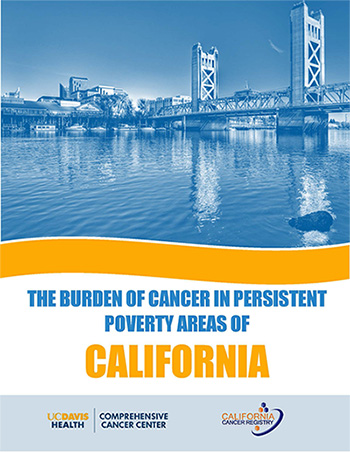A new report from UC Davis Comprehensive Cancer Center has uncovered significant disparities in cancer incidence among people in persistent poverty areas of California. Lung, liver, stomach and cervical cancers are significantly more prevalent within poverty areas than among California’s population at large. Cancer diagnosis is also more likely to be delayed in these areas.
The report, titled “The Burden of Cancer in Persistent Poverty Areas of California,” is designed to help guide policymakers, clinicians, and researchers as they develop strategies to support low-income Californians.
The report, which uses data from the California Cancer Registry, was prepared by the California Cancer Reporting and Epidemiologic Surveillance (CalCARES) program team. CalCARES, based at UC Davis Comprehensive Cancer Center, manages the day-to-day operations of the registry for the California Department of Public Health.
“Our main purpose was to understand cancer incidence patterns among Californians in persistent poverty areas, given that they face numerous challenges in addition to their cancer diagnoses,” said Ani Movsisyan Vernon, lead author and researcher with the CalCARES team.
Linking poverty to cancer disparities
U.S. counties experiencing persistent poverty — 20% or greater poverty rates over an extended period of time — are more likely to be rural and to have larger proportions of racial and ethnic minorities. People living in those areas are more likely to be exposed to environmental and occupational carcinogens and to have poor access to reliable transportation and health care, among other stressors.
While links between poverty and worse cancer outcomes are known, Movsisyan Vernon and coauthors wanted to determine the relationship between persistent poverty in California and cancer incidence. Are people in persistent poverty areas at higher risk of certain cancers? Are they diagnosed at later stages?

The combined burdens of cancer and poverty
To answer their questions, researchers used California Cancer Registry data from 2006 to 2020 and annual census tract population estimates from the National Cancer Institute.
They found that proportions of Latino and Black patients are larger in persistent poverty areas, and that most patients in poverty are uninsured or have public health insurance.
Importantly, higher incidence rates of late-stage lung, colorectal, and cervical cancers, which are all screen-detectable, were observed in persistent poverty areas. This lag in timely diagnoses can result in treatment delays and worse cancer outcomes.
The other authors of the study are Frances B. Maguire, Ayman T. Ullah, Brenda M. Hofer, Arti Parikh-Patel, Theresa H. M. Keegan, and Theodore Wun, all of UC Davis.





